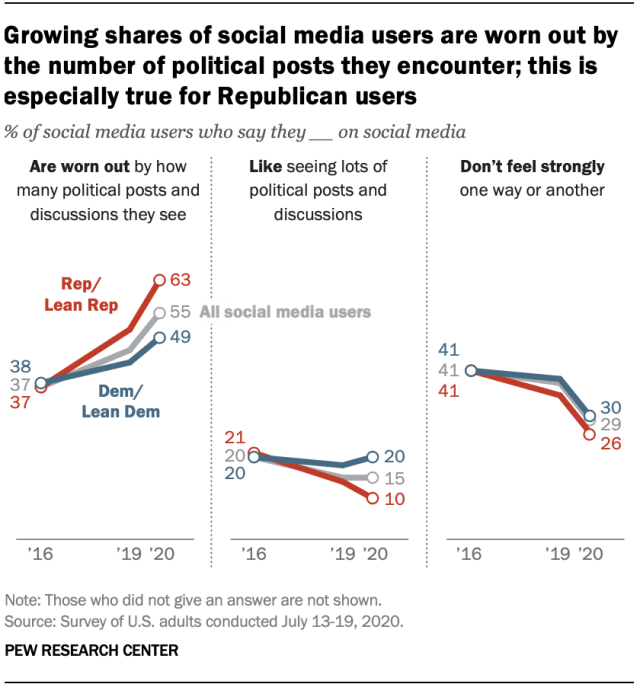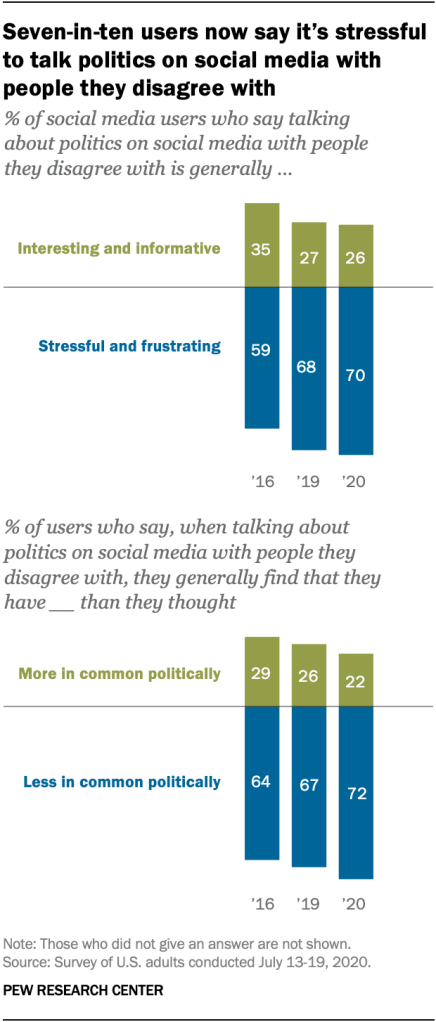The 2020 presidential election is more than two months away, but many social media users in the United States already are exhausted by how much political content they see on these platforms.
Some 55% of adult social media users say they feel “worn out” by how many political posts and discussions they see on social media, according to a Pew Research Center survey of U.S. adults conducted July 13-19. This share has risen 18 percentage points since the Center first asked this question in the summer leading up to the 2016 presidential contest and 9 points just in the past year.
At the same time, users are less ambivalent about seeing these types of posts today than in the past. Today, 29% of social media users say they don’t feel strongly one way or another about encountering political discussions, down from about four-in-ten in 2016 and 2019. Across these surveys, including the latest, relatively small shares – ranging from 15% to 20% – have said they like seeing lots of political posts on social media.
This is part of a series of posts on Americans’ experiences with and attitudes about the role of social media in politics today. To explore this, we surveyed 10,211 U.S. adults from July 13 to 19, 2020. Everyone who took part is a member of the Center’s American Trends Panel (ATP), an online survey panel that is recruited through national, random sampling of residential addresses. This way nearly all U.S. adults have a chance of selection. The survey is weighted to be representative of the U.S. adult population by gender, race, ethnicity, partisan affiliation, education and other categories. Read more about the ATP’s methodology.
Here are the questions used for this report, along with responses, and its methodology.
The sense of exhaustion rather than excitement over seeing political content on social media holds true across political parties. But while there were no partisan differences on this question in 2016, Republicans and Republican-leaning independents who use social media are more likely than users who are Democrats and Democratic leaners to say they are worn out by how many political posts they encounter on social media (63% vs. 49%). On the other hand, today Democratic social media users are twice as likely as their Republican counterparts to say they like seeing this kind of content on these platforms (20% vs. 10%), with this sentiment among Republican users falling 11 percentage points since 2016.
Americans who use social media sites are also more likely today than in 2016 to describe the political discourse on these platforms in negative terms. Seven-in-ten now say they find it “stressful and frustrating” to talk about politics on social media with people they disagree with, up from 59% in 2016. At the same time, the share who say they find these interactions “interesting and informative” has dropped from 35% to 26% over the past four years.
The new survey also finds that social media users generally do not find common ground as a result of online discussions about politics. Roughly seven-in-ten users (72%) say that discussing politics on social media with people they disagree with usually leads them to find out they have “less in common politically” than they expected, while 22% report finding out they have “more in common politically” than previously thought.
These figures have become more negative over time. For example, the share of users who say that talking about politics on social media with people they disagree with leads them to find that they have less in common politically has grown from 64% in 2016 to 72% today.
As was true in previous Center surveys, Republicans and Democrats who use social media are about equally likely to describe these disagreements as frustrating or say discussing politics with someone they disagree with reveals that they have less in common than they thought. For example, 71% of Republican users say in this new survey they have found it frustrating and stressful to talk politics with others on social media that they disagree with, while a similar share of Democratic users (69%) feel the same way.
These findings are in line with a fall 2019 Pew Research Center survey showing that around two-thirds of Americans reported feeling “worn out” by the amount of news they encounter. A separate Center survey conducted in spring 2019 found that more than eight-in-ten Americans said the tone and nature of political debate in the nation had become more negative over the last several years. Half of U.S. adults surveyed said talking about politics with people they disagree with politically is “stressful and frustrating.”
Note: This is the first in a series of blog posts leading up to the 2020 presidential election that explores the role of social media in politics today. Here are the questions used for this report, along with responses, and its methodology.

"social" - Google News
August 19, 2020 at 11:25PM
https://ift.tt/2EhTGBM
55% of U.S. social media users say they are 'worn out' by political posts and discussions - Pew Research Center
"social" - Google News
https://ift.tt/38fmaXp
https://ift.tt/2WhuDnP
Bagikan Berita Ini

















0 Response to "55% of U.S. social media users say they are 'worn out' by political posts and discussions - Pew Research Center"
Post a Comment